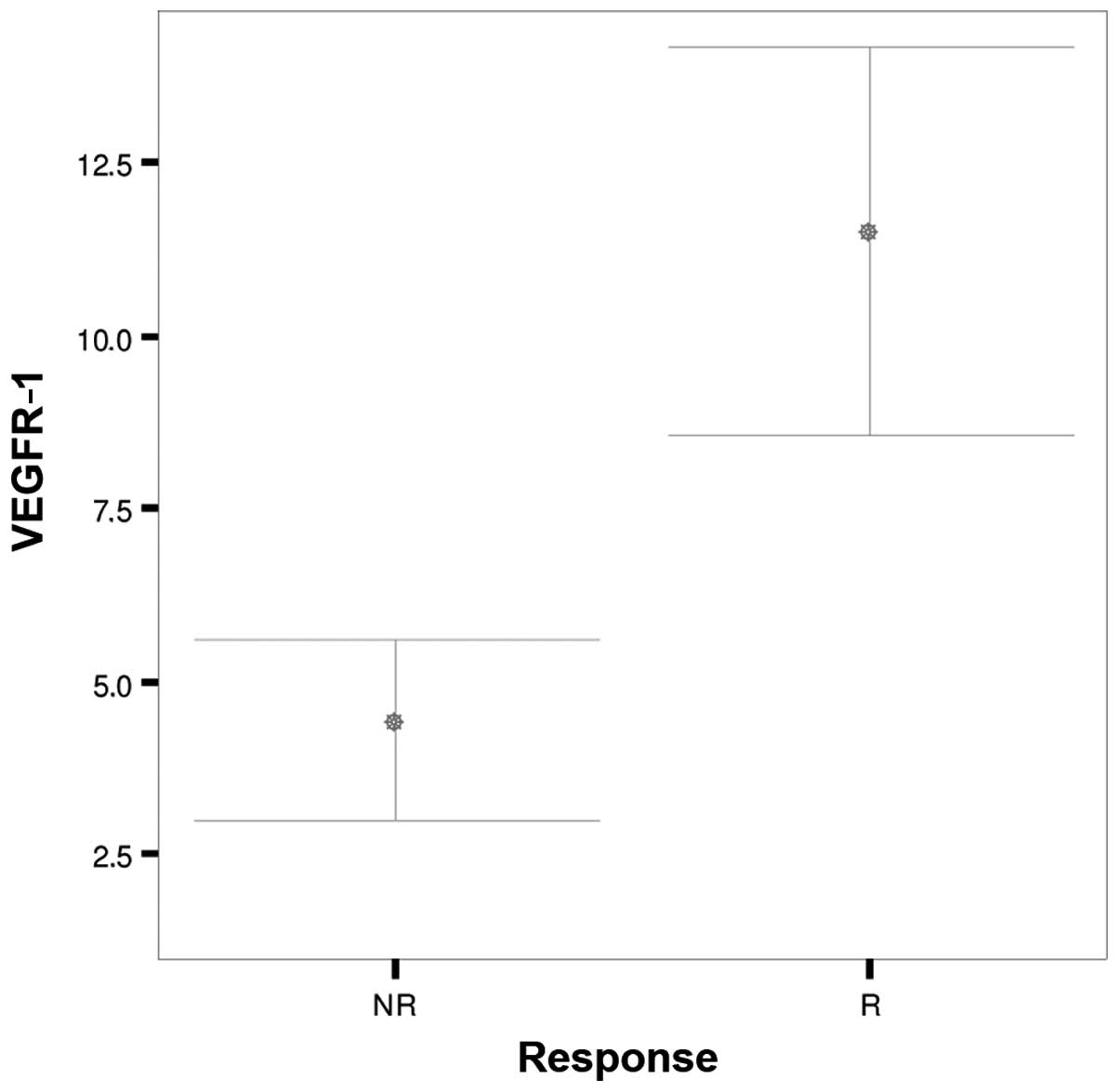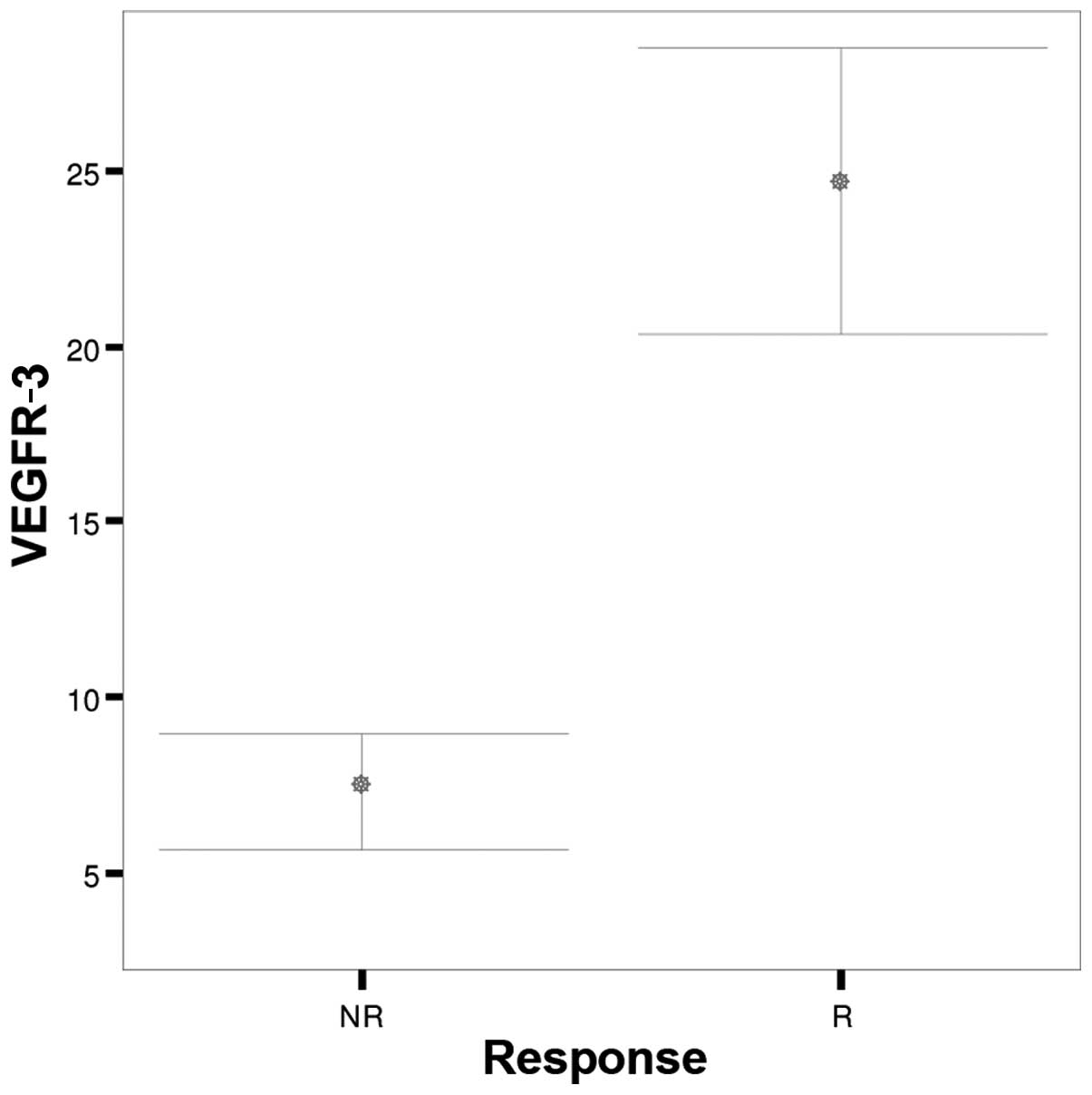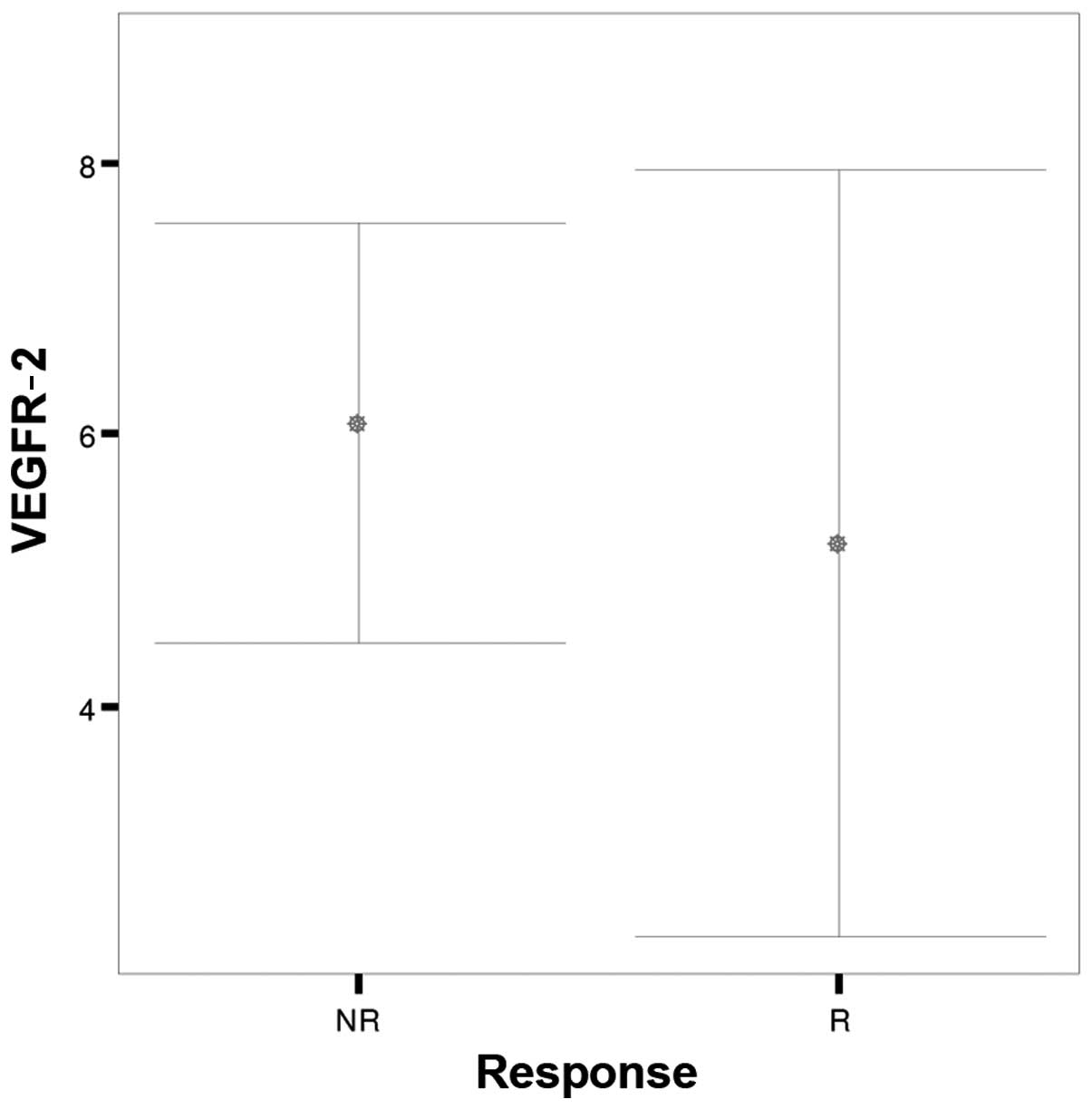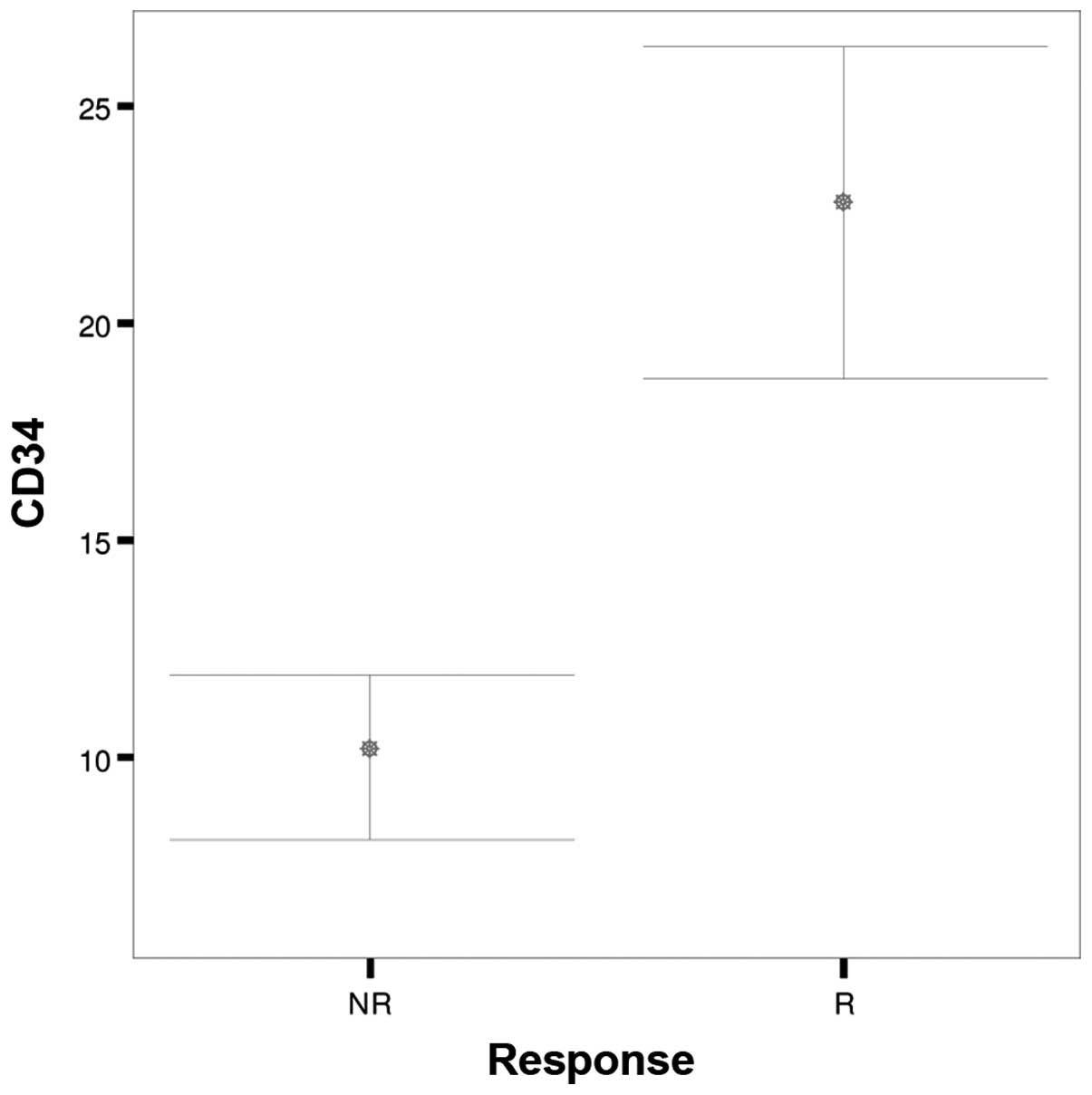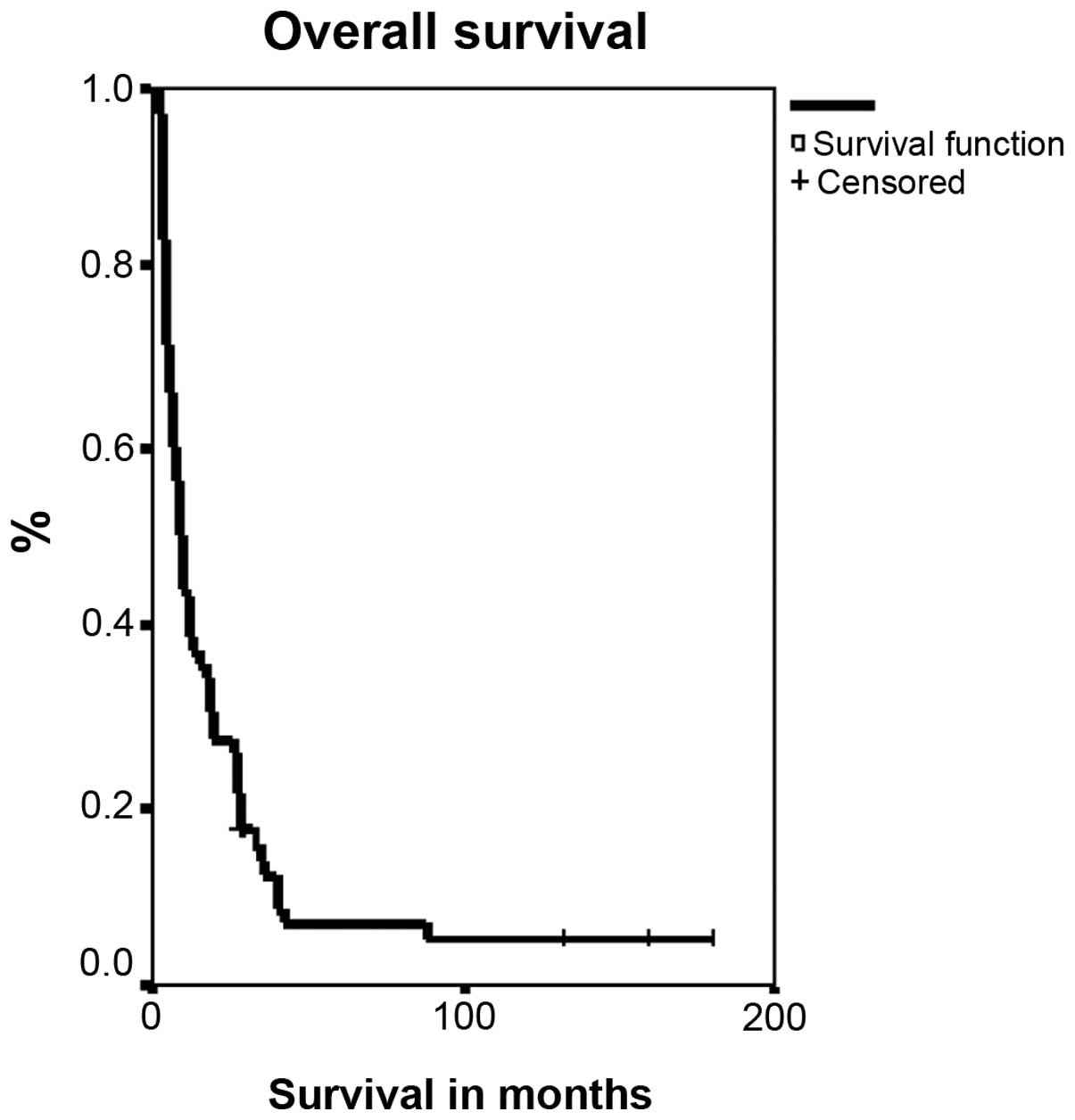|
1
|
Hanahan D and Weinberg RA: Hallmarks of
cancer: The next generation. Cell. 144:646–674. 2011. View Article : Google Scholar : PubMed/NCBI
|
|
2
|
Benelli R, Lorusso G, Albini A and Noonan
DM: Cytokines and chemokines as regulators of angiogenesis in
health and disease. Curr Pharm Des. 12:3101–3115. 2006. View Article : Google Scholar : PubMed/NCBI
|
|
3
|
Bremnes RM, Camps C and Sirera R:
Angiogenesis in non-small cell lung cancer: The prognostic impact
of neoangiogenesis and the cytokines VEGF and bFGF in tumours and
blood. Lung Cancer. 51:143–158. 2006. View Article : Google Scholar : PubMed/NCBI
|
|
4
|
de Santa Pau E Carrillo, Arias FC, Caso
Peláez E, Muñoz Molina GM, Sánchez Hernández I, Muguruza Trueba I,
Moreno Balsalobre R, Sacristán López S, Gómez Pinillos A and del
Val Toledo Lobo M: Prognostic significance of the expression of
vascular endothelial growth factors A, B, C and D and their
receptors R1, R2 and R3 in patients with nonsmall cell lung cancer.
Cancer. 115:1701–1712. 2009. View Article : Google Scholar : PubMed/NCBI
|
|
5
|
Cébe-Suarez S, Zehnder-Fjällman A and
Ballmer-Hofer K: The role of VEGF receptors in angiogenesis;
complex partnerships. Cell Mol Life Sci. 63:601–615. 2006.
View Article : Google Scholar : PubMed/NCBI
|
|
6
|
Rapisarda A and Melillo G: Role of the
VEGF/VEGFR axis in cancer biology and therapy. Adv Cancer Res.
114:237–267. 2012. View Article : Google Scholar : PubMed/NCBI
|
|
7
|
Smith NR, Baker D, James NH, Ratcliffe K,
Jenkins M, Ashton SE, Sproat G, Swann R, Gray N, Ryan A, et al:
Vascular endothelial growth factor receptors VEGFR-2 and VEGFR-3
are localized primarily to the vasculature in human primary solid
cancers. Clin Cancer Res. 16:3548–3561. 2010. View Article : Google Scholar : PubMed/NCBI
|
|
8
|
Hiratsuka S, Nakamura K, Iwai S, Murakami
M, Itoh T, Kijima H, Shipley JM, Senior RM and Shibuya M: MMP9
induction by vascular endothelial growth factor receptor-1 is
involved in lung-specific metastasis. Cancer Cell. 2:289–300. 2002.
View Article : Google Scholar : PubMed/NCBI
|
|
9
|
Lenton K: VEGFR-2 (KDR/Flk-1). J Biol
Regul Homeost Agents. 16:227–232. 2002.PubMed/NCBI
|
|
10
|
Shibuya M and Claesson-Welsh L: Signal
transduction by VEGF receptors in regulation of angiogenesis and
lymphangiogenesis. Exp Cell Res. 312:549–560. 2006. View Article : Google Scholar : PubMed/NCBI
|
|
11
|
Fontanini G, Bigini D, Vignati S, Basolo
F, Mussi A, Lucchi M, Chine S, Angeletti CA, Harris AL and
Bevilacqua G: Microvessel count predicts metastatic disease and
survival in non-small cell lung cancer. J Pathol. 177:57–63. 1995.
View Article : Google Scholar : PubMed/NCBI
|
|
12
|
Kumar P, Wang JM and Bernabeu C: CD 105
and angiogenesis. J Pathol. 178:363–366. 1996. View Article : Google Scholar : PubMed/NCBI
|
|
13
|
Meert AP, Paesmans M, Martin B, Delmotte
P, Berghmans T, Verdebout JM, Lafitte JJ, Mascaux C and Sculier JP:
The role of microvessel density on the survival of patients with
lung cancer: A systematic review of the literature with
meta-analysis. Br J Cancer. 87:694–701. 2002. View Article : Google Scholar : PubMed/NCBI
|
|
14
|
Volm M, Koomägi R and Mattern J:
Prognostic value of vascular endothelial growth factor and its
receptor Flt-1 in squamous cell lung cancer. Int J Cancer.
74:64–68. 1997. View Article : Google Scholar : PubMed/NCBI
|
|
15
|
Decaussin M, Sartelet H, Robert C, Moro D,
Claraz C, Brambilla C and Brambilla E: Expression of vascular
endothelial growth factor (VEGF) and its two receptors
(VEGF-R1-Flt1 and VEGF-R2-Flk1/KDR) in non-small cell lung
carcinomas (NSCLCs): Correlation with angiogenesis and survival. J
Pathol. 188:369–377. 1999. View Article : Google Scholar : PubMed/NCBI
|
|
16
|
Delmotte P, Martin B, Paesmans M,
Berghmans T, Mascaux C, Meert AP, Steels E, Verdebout JM, Lafitte
JJ and Sculier JP: VEGF and survival of patients with lung cancer:
A systematic literature review and meta-analysis. Rev Mal Respir.
19:577–584. 2002.(In French). PubMed/NCBI
|
|
17
|
Zhan P, Wang J, Lv XJ, Wang Q, Qiu LX, Lin
XQ, Yu LK and Song Y: Prognostic value of vascular endothelial
growth factor expression in patients with lung cancer: A systematic
review with meta-analysis. J Thorac Oncol. 4:1094–1103. 2009.
View Article : Google Scholar : PubMed/NCBI
|
|
18
|
Arinaga M, Noguchi T, Takeno S, Chujo M,
Miura T and Uchida Y: Clinical significance of vascular endothelial
growth factor C and vascular endothelial growth factor receptor 3
in patients with nonsmall cell lung carcinoma. Cancer. 97:457–464.
2003. View Article : Google Scholar : PubMed/NCBI
|
|
19
|
Pajares MJ, Agorreta J, Larrayoz M, Vesin
A, Ezponda T, Zudaire I, Torre W, Lozano MD, Brambilla E, Brambilla
C, et al: Expression of tumor-derived vascular endothelial growth
factor and its receptors is associated with outcome in early
squamous cell carcinoma of the lung. J Clin Oncol. 30:1129–1136.
2012. View Article : Google Scholar : PubMed/NCBI
|
|
20
|
Macchiarini P, Fontanini G, Hardin MJ,
Squartini F and Angeletti CA: Relation of neovascularisation to
metastasis of non-small-cell lung cancer. Lancet. 340:145–146.
1992. View Article : Google Scholar : PubMed/NCBI
|
|
21
|
Kim ES, Herbst RS, Wistuba II, Lee JJ,
Blumenschein GR Jr, Tsao A, Stewart DJ, Hicks ME, Erasmus J Jr,
Gupta S, et al: The BATTLE trial: Personalizing therapy for lung
cancer. Cancer Discov. 1:44–53. 2011. View Article : Google Scholar : PubMed/NCBI
|
|
22
|
Pastorino U, Andreola S, Tagliabue E,
Pezzella F, Incarbone M, Sozzi G, Buyse M, Menard S, Pierotti M and
Rilke F: Immunocytochemical markers in stage I lung cancer:
Relevance to prognosis. J Clin Oncol. 15:2858–2865. 1997.PubMed/NCBI
|
|
23
|
Zhao YY, Xue C, Jiang W, Zhao HY, Huang Y,
Feenstra K, Resau JH, Qian CN and Zhang L: Predictive value of
intratumoral microvascular density in patients with advanced
non-small cell lung cancer receiving chemotherapy plus bevacizumab.
J Thorac Oncol. 7:71–75. 2012. View Article : Google Scholar : PubMed/NCBI
|
|
24
|
Borgia JA, Pithadia R, Ibrahem Z, Fhied C,
Basu S, Lie WR, Fidler MJ, Batus M and Bonomi PD: Potential
predictive value of hepatocyte growth factor (HGF) in advanced
non-small cell lung cancer (NSCLC) treated with a platinum doublet
and bevacizumab. J Clin Oncol. 32(Suppl): e220002014.
|
|
25
|
Batus M, Pithadia R, Kubasiak J, Fhied C,
Ibrahem Z, Melinamani S, Fughhi I, Lie WR, Basu S, Fidler MJ,
Bonomi PD and Borgia JA: Differences in circulating angiogenic
biomarkers as prognosticator for outcome in bevacizumab-treated
nonsquamous non-small cell lung cancer (NSCLC) patients. J Clin
Oncol. 32(5s Suppl): S110372014.
|
|
26
|
Pohl G, Krajnik G, Malayeri R, Müller RM,
Klepetko W, Eckersberger F, Schafer-Prokop C, Pokrajac B, Schmeikal
S, Maier A, et al: Induction chemotherapy with the TIP regimen
(paclitaxel/ifosfamide/cisplatin) in stage III non-small cell lung
cancer. Lung Cancer. 54:63–67. 2006. View Article : Google Scholar : PubMed/NCBI
|
|
27
|
Kosmas C, Tsavaris NB, Polyzos A,
Kalofonos HP, Sepsas E, Malamos NA, Vadiaka M, Dosios T and
Antonopoulos MJ: A phase II study of
paclitaxel-ifosfamide-cisplatin combination in advanced nonsmall
cell lung carcinoma. Cancer. 89:774–782. 2000. View Article : Google Scholar : PubMed/NCBI
|
|
28
|
Ripley RT and Rusch VW: Role of induction
therapy: Surgical resection of non-small cell lung cancer after
induction therapy. Thorac Surg Clin. 23:273–285. 2013. View Article : Google Scholar : PubMed/NCBI
|
|
29
|
Greene FL, Page DC, Fleming ID, et al:
AJCC Cancer staging manual (6th). Springer-Verlag. New York:
p4352002.
|
|
30
|
Common Terminology Criteria for Adverse
Events (CTCAE). Version 4.0. 2009.http://evs.nci.nih.gov/ftpl/CTCAE/CTCAE
_4.03_2010-06-14_QuickReference_8.5x11.pdfAccessed. May
28–2009
|
|
31
|
Therasse P, Arbuck SG, Eisenhauer EA,
Wanders J, Kaplan RS, Rubinstein L, Verweij J, Van Glabbeke M, van
Oosterom AT, Christian MC and Gwyther SG: New guidelines to
evaluate the response to treatment in solid tumors. European
Organization for Research and Treatment of Cancer, National Cancer
Institute of the United States, National Cancer Institute of
Canada. J Natl Cancer Inst. 92:205–216. 2000. View Article : Google Scholar : PubMed/NCBI
|
|
32
|
Weidner N, Semple JP, Welch WR and Folkman
J: Tumor angiogenesis and metastasis-correlation in invasive breast
carcinoma. N Engl J Med. 324:1–8. 1991. View Article : Google Scholar : PubMed/NCBI
|
|
33
|
Trivella M, Pezzella F, Pastorino U,
Harris AL and Altman DG: Prognosis In Lung Cancer (PILC)
Collaborative Study Group: Microvessel density as a prognostic
factor in non-small-cell lung carcinoma: A meta-analysis of
individual patient data. Lancet Oncol. 8:488–499. 2007. View Article : Google Scholar : PubMed/NCBI
|
|
34
|
Horita N, Miyazawa N, Morita S, Kojima R,
Kimura N, Kaneko T and Ishigatsubo Y: Preoperative chemotherapy is
effective for stage III resectable non-small-cell lung cancer:
Metaanalysis of 16 trials. Clin Lung Cancer. 14:488–494. 2013.
View Article : Google Scholar : PubMed/NCBI
|
|
35
|
Linderholm BK, Lidbrink E, Tallroth E,
Einbeigi Z, Svensson H, von Wachenfeldt A, Norberg B, Carlsson L,
Olsson ME, Bergh J, et al: Angiogenic factors in relation to
clinical effect in a phase II trial of weekly paclitaxel. Breast.
22:1142–1147. 2013. View Article : Google Scholar : PubMed/NCBI
|
|
36
|
Ma J and Waxman DJ: Combination of
antiangiogenesis with chemotherapy for more effective cancer
treatment. Mol Cancer Ther. 7:3670–3684. 2008. View Article : Google Scholar : PubMed/NCBI
|
|
37
|
Amin DN, Hida K, Bielenberg DR and
Klagsbrun M: Tumor endothelial cells express epidermal growth
factor receptor (EGFR) but not ErbB3 and are responsive to EGF and
to EGFR kinase inhibitors. Cancer Res. 66:2173–2180. 2006.
View Article : Google Scholar : PubMed/NCBI
|
|
38
|
Ferrara N and Kerbel RS: Angiogenesis as a
therapeutic target. Nature. 438:967–974. 2005. View Article : Google Scholar : PubMed/NCBI
|
|
39
|
Crinò L and Metro G: Therapeutic options
targeting angiogenesis in nonsmall cell lung cancer. Eur Respir
Rev. 23:79–91. 2014. View Article : Google Scholar : PubMed/NCBI
|
|
40
|
Chou TC, Motzer RJ, Tong Y and Bosl GJ:
Computerized quantitation of synergism and antagonism of taxol,
topotecan and cisplatin against human teratocarcinoma cell growth:
A rational approach to clinical protocol design. J Natl Cancer
Inst. 86:1517–1524. 1994. View Article : Google Scholar : PubMed/NCBI
|
|
41
|
Kondagunta GV, Bacik J, Donadio A, Bajorin
D, Marion S, Sheinfeld J, Bosl GJ and Motzer RJ: Combination of
paclitaxel, ifosfamide and cisplatin is an effective second-line
therapy for patients with relapsed testicular germ cell tumors. J
Clin Oncol. 23:6549–6555. 2005. View Article : Google Scholar : PubMed/NCBI
|
|
42
|
Lissoni AA, Colombo N, Pellegrino A, Parma
G, Zola P, Katsaros D, Chiari S, Buda A, Landoni F, Peiretti M, et
al: A phase II, randomized trial of neo-adjuvant chemotherapy
comparing a three-drug combination of paclitaxel, ifosfamide and
cisplatin (TIP) versus paclitaxel and cisplatin (TP) followed by
radical surgery in patients with locally advanced squamous cell
cervical carcinoma: The Snap-02 Italian Collaborative Study. Ann
Oncol. 20:660–665. 2009. View Article : Google Scholar : PubMed/NCBI
|
|
43
|
Mountzios G, Dimopoulos MA, Bamias A,
Vourli G, Kalofonos H, Aravantinos G, Fountzilas G and
Papadimitriou CA: Randomized multicenter phase II trial of
cisplatin and ifosfamide with or without paclitaxel in recurrent or
metastatic carcinoma of the uterine cervix: A Hellenic Cooperative
Oncology Group (HeCOG) study. Ann Oncol. 20:1362–1368. 2009.
View Article : Google Scholar : PubMed/NCBI
|















